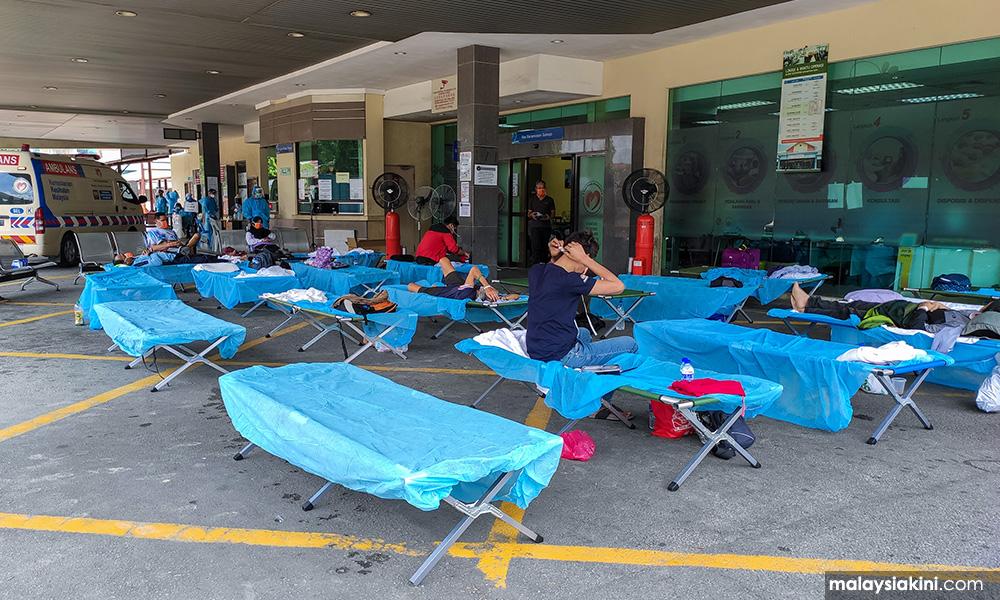Are we a failed state?
A Bloomberg columnist wrote an article for which the introduction reads: “The country used to punch above its weight on the global stage. Now, white flags seem like a surrender to dysfunction.”
These words touched a nerve. That’s what the gods of WhatsApp groups tell me, at least. And I have great faith in them. I think it made thousands of Malaysians feel just that much more defeated and that much more hopeless.
It was a charge made right when the latest developments in Malaysian politics suggest that the Sheraton Move has not, in fact, actually ended. Before we talk about what our next steps should be, let’s examine the term "failed state".
It is a term of some personal relevance to me. My degree in university was called (in full) a “Special Concentration in Peace and Conflict Studies.” The cases I was most interested in at the time were countries that seemed to be falling apart in the 1990s amidst the end of the Cold War.
The transition from a bipolar to a unipolar world was marked by considerable violence, as is often the case with political transitions. The former Yugoslavia was one such case, and sub-Saharan Africa was probably the continent that saw the most of such violence in that decade.
I studied the latter mostly, spending some time in Sierra Leone as part of my work. In the course of said studies, we came across the term "failed state" a lot. I don’t usually engage in academic discourse in my articles, but just for today, perhaps we shall briefly indulge.
Max Weber defined the state as an entity that succeeds in maintaining a monopoly on the legitimate use of physical force within its borders. This is generally accepted as a basic, fundamental defining principle.
In this sense, the breakdown into "might makes right" civil wars experienced by places such as Sierra Leone, Somalia and others definitely made the term "failed state" apt.
At the height of these civil wars, power was defined by the amount of firepower one had at their disposal, and not in any way by legitimate institutions of government.
In some cases, bullets cost less than rice, and that really is sometimes just about all you need to understand the situation on the ground. In essence, there was no functioning government, only warlordism.
Most debilitating crisis
In Malaysia, the military and police are intact, and most of our governing institutions continue to function as designed (though some would say barely).
So, by that definition, we are certainly not a failed state yet - for whatever comfort that may bring whomever. All that said, what are currently the two most important pillars of the state are indeed collapsing. The first of these is our nation’s healthcare system.
Ever so slowly, the alarm bells are ringing louder (though they should have been rung weeks ago). Health director-general Noor Hisham Abdullah has admitted that we are on the verge of paralysis.
If we do not reverse this trend, then there may be no practical difference between us and a failed state. People will be dying, and there won’t be much we can do about it.

The second pillar of the state that is collapsing is political governance. It is not a stretch to say that we are facing Malaysia’s most debilitating political crisis.
Political crises in the past involved one titan fighting against another. In the end, somebody won, and life went on. In today’s political crisis, there will be no winners among our political elite. Only losers.
While I agree with columnist Wong Chin Huat who stated that there is no point to call for Prime Minister Muhyiddin Yassin to resign unless there is a viable government in waiting, I also believe there is no doubt that the current government is a failed government.
In my view, Covid-19 numbers alone outweigh any other argument on this matter. It is as obvious as the "bullets cheaper than rice" scenario.
Prepare alternative
What started with the Sheraton Move has not ended. This is the clearest indictment yet that Westminster democracy is little beyond another "white man’s curse" that we have found ourselves stuck with.
If there is always opportunity in crisis, however, then the opportunity here is to recognise it for the failure that it is, and start moving on. At the rate things are going, I strongly believe that if we do not innovate, we will die.
If we limit ourselves to looking for solutions from the same political circles we have been trapped in for so long, we will die. If we are willing to look beyond the usual political actors and innovate our democracy, we may have a chance at life.
My colleagues and I continue to work on the details. In the meantime, the rest of us should start getting ready.
As some of us call for Muhyiddin to step down, we must also prepare an alternative - and soon.
I remember what it was like when Dr Mahathir Mohamad arrogantly resigned in 2020, thinking he held all the cards.
The country was in political limbo for so long. If we don’t have a plan this time, then we will not only be in exactly the same limbo - we will be in that leaderless limbo while fighting a raging pandemic. - Mkini
NATHANIEL TAN works with Projek #BangsaMalaysia. He’s working on a plan with some of the best Malaysians he knows. Twitter: @NatAsasi, Clubhouse: @Nathaniel_Tan, Email: nat@engage.my. #NextGenDemocracy.
The views expressed here are those of the author/contributor and do not necessarily represent the views of MMKtT.
✍ Credit given to the original owner of this post : ☕ Malaysians Must Know the TRUTH
🌐 Hit This Link To Find Out More On Their Articles...🏄🏻♀️ Enjoy Surfing!




















Post a Comment